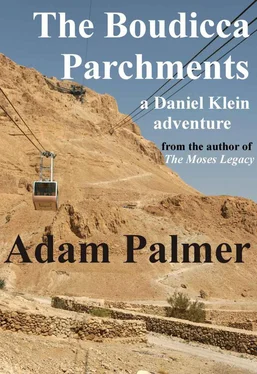Adam Palmer - The Boudicca Parchments
Здесь есть возможность читать онлайн «Adam Palmer - The Boudicca Parchments» весь текст электронной книги совершенно бесплатно (целиком полную версию без сокращений). В некоторых случаях можно слушать аудио, скачать через торрент в формате fb2 и присутствует краткое содержание. Жанр: Прочие приключения, на английском языке. Описание произведения, (предисловие) а так же отзывы посетителей доступны на портале библиотеки ЛибКат.
- Название:The Boudicca Parchments
- Автор:
- Жанр:
- Год:неизвестен
- ISBN:нет данных
- Рейтинг книги:3 / 5. Голосов: 1
-
Избранное:Добавить в избранное
- Отзывы:
-
Ваша оценка:
- 60
- 1
- 2
- 3
- 4
- 5
The Boudicca Parchments: краткое содержание, описание и аннотация
Предлагаем к чтению аннотацию, описание, краткое содержание или предисловие (зависит от того, что написал сам автор книги «The Boudicca Parchments»). Если вы не нашли необходимую информацию о книге — напишите в комментариях, мы постараемся отыскать её.
The Boudicca Parchments — читать онлайн бесплатно полную книгу (весь текст) целиком
Ниже представлен текст книги, разбитый по страницам. Система сохранения места последней прочитанной страницы, позволяет с удобством читать онлайн бесплатно книгу «The Boudicca Parchments», без необходимости каждый раз заново искать на чём Вы остановились. Поставьте закладку, и сможете в любой момент перейти на страницу, на которой закончили чтение.
Интервал:
Закладка:
“Julia,” said Helen with a smile. She wanted to embrace her daughter, but it was hard to when she was being swarmed by the equally loving embrace of her granddaughters. When she finally extricated herself from the zealous affections of the happy threesome, Helen and Julia exchanged a quick hug before Helen exerted her matriarchal authority to restore some discipline to the situation.
“All right girls,” she said firmly, “to the car.”
This produced a quickly scramble back to the luggage trolley which very nearly degenerated into a three-way fight. But Helen made short shrift of this.
“Cut it out girls! No you can’t ride the trolley. You’ll have to learn to walk. You’re not babies.”
Coming from their grandmother, this seemed to work.
It was a long walk to the car, especially in the humid heat. The airport town of Lod was on the coastal strip and on hot days, with the humidity from the sea, it could feel like a sauna. To Helen this was nothing, but neither Julia nor the little ones were used to it. Still, they were troopers and none of them wanted to wilt or succumb to complaining before the others did. Soon they were in the car on the way to Jerusalem, with the air conditioning turned up to high.
Julia thought she noticed a car behind them that had pulled out of the airport car park at the same time as hers. Presumably the driver of the vehicle was going to Jerusalem too, or at least somewhere near Jerusalem. At any rate, she thought nothing more of it.
Chapter 50
“Aristobulos wasn’t just a common name in the Herodian dynasty, Daniel. It was also the name of one of the seventy disciples — the one who went to Britain.”
“What do you mean seventy disciples? I thought there were only twelve.”
Ted replied in his slow, deliberate spoken baritone.
“There were twelve immediate disciples, the ones who were part of Christ’s immediate circle. But in Luke, Chapter 10, it describes how Jesus appointed seventy disciples — or in some traditions seventy two — and sent them out in pairs to spread the word to what it calls ‘every city and place whither he himself was about to come.’ This is generally understood to mean the whole world. In other words, they were sent out to spread the word to the world at large.”
“It just goes to show the gaps in my knowledge,” said Daniel sheepishly. I didn’t know anything about these seventy disciples. Are they called disciples rather than apostles to distinguish them from the original twelve?”
“Oh er no. In fact, the eastern churches call them the Seventy Apostles. But the western churches refer to them as disciples.”
“And Aristobulos was one that he sent to Britain?”
“Yes. According to tradition.”
“But you said Jesus sent them out in pairs”
“That’s right. According to eastern orthodox tradition he was the brother of Barnabus and both he and his brother travelled with Saint Paul.”
“How much of this is known and how much of it is speculation?”
“It’s pretty much all speculation — or let’s call it tradition. But that’s with reference to the origins of Aristobulos. Although there’s no documentary evidence to support it, there is a general acceptance in the Roman Catholic and Eastern Orthodox churches that there was a person called Aristobulos of Britannia who lived, preached and died in Roman Britain in the first century . He is regarded as the first Bishop of Britain and a saint, although the Catholics and Orthodox differ on whether or not he was martyred. The Catholics say yes; the Orthodox say no.”
“But they don’t differ on whether he was one of those seventy disciples or apostles?”
“No, they agree on that. It’s just that apart from the religious tradition itself, there’s no evidence that such a person was ever in Britain.”
“Well this ketuba might just change that — albeit at the price of making him a bit more Jewish than the churches might like.”
“Well let’s not forget that the early Christians basically thought of themselves as messianic Jews.”
“True.”
“There is one other thing, Daniel.”
“Yes.”
“Well you mentioned that the name Aristobulos was common in the Herodian family. It has been speculated — in the Roman Catholic Encyclopaedia no less — that Aristobulos of Brittania was Aristobulos the Minor.”
Daniel recognized the name from his knowledge of Judean history.
“The youngest son of Aristobulos the Fourth?”
“Exactly… and thus a grandson of Herod the Great.”
Daniel thought about this for a long time.
“Very little is known about Aristobulos the Minor, Ted. Unlike some of the Herodian family’s other progeny, he lived a relatively quiet life, except when he chided Caligula for setting up statues of pagan gods in the Temple.”
“A very courageous act, considering Caligula’s paranoid propensities.”
“Yes, but he came through okay because Caligula died in 41 and we know that Aristobulos the Minor outlived his brother, Agrippa the First, who died in the year 44.”
“But of course, we still don’t know when the ketuba was actually from.”
“No we don’t. But like I said I asked my lawyer to get the police to have it carbon dated.”
“If does turn out to be Aristobulos the Minor, then maybe he didn’t live such a quiet life after all.”
The conversation fizzled out at this point.
“Okay Ted, I’ve told you what I’ve got. Now you tell me your big news.”
“We found another piece of parchment, at the dig site. It was inside a clay jar sealed with a cork.”
“And what was on this parchment.”
“It was a map — a map of Europe as envisaged by the Romans In the first century. There were no Americas and the bulk Asia was largely unknown. There was Europe and Africa and the near and middle east. But everything centered around the Mediterranean.”
“But what’s so special about it that it got you so excited?”
“Well firstly the parchment itself didn’t look like any traditional Romano-British parchment. I can show it to you afterwards, but I suspect I know what you’re going to tell me. It’s probably a Jewish-style parchment.”
“What makes you so sure?”
“Firstly the type of parchment itself. Secondly, because there’s writing on the map and it isn’t Latin — or even the Roman alphabet. I’ll need to show it to you, but based on what everything we’ve been talking about, I suspect it’s Hebrew or Aramaic.”
“Okay let’s head back to the service station and you can show it to me there.”
“Got that,” said Sarit from the front, pulling into the slow lane, preparing to take the next exit.
“Can I ask you something about those names Daniel?”
“What names?”
“The names on the marriage certificate.”
“Barach and Aristobulos?”
“No, the bride… and her father.”
“Lanevshiah and Farashotagesh?”
“Yes.”
“How certain are you about the pronunciation. I mean you said yourself that foreign names were hard to transliterate.”
“Well first of all it was a complete guess as to where the vowels go. I mean I could have inserted vowels where none were intended or missed out vowels that were supposed to be there. Also like I mentioned, where there’s a Hebrew letter vav it can either be pronounced like the letter V or used as a placeholder for one of two vowels, either oo as in soon or O as box. We can play around with various combinations and see if we can come up with anything that you recognize as a Romano-British name.”
“But you’re sure about the consonants?”
“Most of them yes.”
Читать дальшеИнтервал:
Закладка:
Похожие книги на «The Boudicca Parchments»
Представляем Вашему вниманию похожие книги на «The Boudicca Parchments» списком для выбора. Мы отобрали схожую по названию и смыслу литературу в надежде предоставить читателям больше вариантов отыскать новые, интересные, ещё непрочитанные произведения.
Обсуждение, отзывы о книге «The Boudicca Parchments» и просто собственные мнения читателей. Оставьте ваши комментарии, напишите, что Вы думаете о произведении, его смысле или главных героях. Укажите что конкретно понравилось, а что нет, и почему Вы так считаете.












